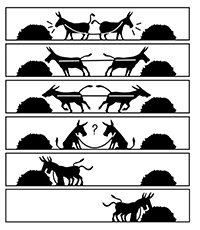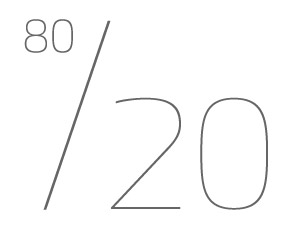Blog » Productivity
7 Paths to Work Zen
Despite my best intentions of being happy & focused while working, sometimes that zen train just comes off the tracks. In those moments, I've found that by adjusting my approach with the following high-level guideposts in mind - I'm usually able to get my mojo back.

Considering that most working aged adults spend a majority of their waking hours working, I believe it is a personal responsibility to take control of my professional destiny and well-being, insomuch as I have control.
How could something as important as this be left in the hands of anyone else? Even in small measures of success, surely this intention can yield valuable results.
The following insights help me get back on track when I'm feeling off my game. Please feel free to leave your own tips, insights or views in the comments section below. Surely, as I grow and learn, my insights will grow and change as well.
1. Balance Work-Life
Over the long run, I have discovered that I care more about my work-life balance, and the circumstances in which I work, rather than the work itself. This is a bold and risky statement. However — putting my personal and professional well-being first does not mean that I don't care about the work product, the technologies I work with, the people I work with, my professionalism, or the businesses I help build. Quite the opposite, I do care.
But at the end of the day, when I sit down to dinner with my wife and family - we don't talk about the work. We talk about how we felt about our day, our well-being, or how our job is influencing who we are. If that happiness factor at work is off balance - it can easily affect my productivity, as well as my well-being beyond the confines of the work environment.

I am not alone in the pursuit of optimizing work zen & happiness. In recent years there's been the emergence of a role within organizations dedicated to cultivating employee happiness, especially in the startup sector. This role is often referred to as FeelGood Managers, or are even Chief Happiness Officers.
When I find work that is a good fit for my skill set and interests, I work intensely. Time becomes a blur. I can't imagine I would ever want to work in any other fashion. However, I become so absorbed in what I do, sometimes I forget about everything else. Time, food, family, friends, personal health, exercise, recharging - these things fall by the wayside. In more unfortunate situations, this mode of operating is forced upon me by business pressures. I become unbalanced, and slowly both my work performance and my personal life suffers. A lose-lose situation begins to creep in.
As I grow older (and hopefully wiser), I've become better at understanding the importance of pacing myself - and balancing work with life, and life with work. Life can feel much richer when the work I do is satisfying. And my work is much more productive when my personal domain is in order. It's all interconnected.
To tip my hat to previous employers, clients and colleagues - I've not been miserable up until this point by any stretch of the imagination. I feel lucky and blessed. But there is always room for more happiness and satisfaction, isn't there? :-)
2. Gain Momentum

The concept of flow, coined by psychologist Mihaly Csikszentmihihalyi, refers to entering a state of becoming wholly absorbed in an activity. Flow states offer a balance of challenge and ease, which enhance their rewarding sensations.
I strive to do work that I feel is a good match for my skillset and interests - mixed with a healthy dose of the unknown. Such a match, paired with the proper working opportunity, allows me to build a series of small victories.
These small victories produce momentum, and something magical happens where the work itself no longer feels like work. Every problem solved becomes slightly easier, and each accomplishment becomes slightly more fulfilling.
3. Compromise Reasonably

According to Mihaly Csikszentmihalyi - we all strive for the expression of our uniqueness. Yet recognize that integration is necessary because we "are also completely enmeshed in networks of relationships with other human beings".
I recently saw a video of Tom Preston-Werner, co-founder of GitHub, talking about their management guidelines. They promote a flat management architecture with self-assembling teams which resonates well with their alignment to the open source software community. They allow their people to work on whatever they want - so long as the work is also connected to strategic company goals. This helps produce a win-win situation.
If I am working on a team project - I realize work zen isn't something that can wholly be achieved in a vacuum. What makes me productive may obviously not make everyone else productive. So there is a healthy and reasonable amount of compromise that needs to happen to make sure others also have peak productivity and that business objectives are being met.
I have found for every requirement that I may not necessarily want to take on for a project - there is usually some area that the client, colleague, or employer is willing to compromise on which may be of importance to me. If there is no meeting of the minds or silver lining to be found - it may just not be the right opportunity, or relationship, for me to be in.
4. Say No
No is one of the hardest words to use in a professional setting. Yet, one of the most powerful to create time and space for the objectives that actually matter the most.

Adding No to your vocabulary is quite different from being a negative person. No creates more meaning for when you actually do say Yes. It creates room for integrity, authenticity, maturity, and self-respect - and is essential to building interpersonal trust. This isn't just my opinion, The Power of No in Psychology Today by Dr. Judith Sillis is packed full of this wisdom.
Professionally, I humbly receive more requests for participation than I can responsibly take on. I chiefly attribute this to a scarcity of talent in my field, a good track record, and good karma. Artfully and delicately applying the power of No has become a tool in my communication repertoire for making room to focus on the commitments that I'm already engaged in.
Look out though, some people or organizations may see it as a personal challenge when confronted with No to convince you otherwise. Either directly, or indirectly by using Jedi mind tricks. This can cause some discomfort, but stand your ground. If you are well within your rights to decline - time will settle out the details. Respect yourself, or no one will respect you.
The math of time is simple: you have less than you think and need more than you know.
Kevin Ashton, Medium, Creative People Say No
5. Integrate Variety
Bradley Staats and Francesca Gino authored a publication based on a study of Japanese bank employees. They found that over the course of a single day - task specialization improved worker productivity. However, when examining the workers' experience over several days, variety of tasks helped improve productivity.

In my domain, I've found it rejuvenating to rotate from coding, to research, to business analysis, to planning, to creative writing, to balancing the books, to social networking, and even running out for errands.
When in a team setting with other developers, I like to encourage rotating responsibilities of the software development life-cycle among team members once in a while (where appropriate according to skill set and timing restrictions). Such rotation of development tasks could include: planning, feature development, research, debugging, code reviews, refactoring, maintenance, testing, documenting, or being the build master. This helps the team become familiar with the entire cycle, and it gives our minds a break from the dulling affects of repetition.
Pair programming is also a great way to mix things up and boost productivity - this is where two developers code together in real-time at the same physical, or virtual, desk.
However, variety is different from being subject to distractions or being pulled away from core competencies. There needs to be a level of acceptance and/or compromise - otherwise the excuse of variety just becomes another tool for exploitation. My main point here is, if feeling burnt out on a task, give it a rest and try exercising a different muscle for a change.
6. Be Present
To me, being present means I am focused on the task at hand. Being focused means better attention, better productivity and controlling the impulse to be drawn away by distractions. This also includes controlling to the best of my ability, my environment.

There's an ancient Samurai saying, which you'll need to have an open mind to interpret. There are many variations of it, but basically it goes: Live your life as if you're already dead.
This doesn't mean go jump off a cliff, or be a zombie. But rather, one day you will no longer be here. Given that billions have come before you, billions will come after you, and that you are merely here for a fraction of a moment in the history of time - what is the best thing you could be doing with this amazing gift of now?
I may be a bit darker than most, but death is something I think about often. I find great calm and freedom in this Samurai saying. My father recently passed and it has affected the way I see time. It motivates me to be more cognizant of how my time is spent. After all, who knows how much of it is left.
7. Simplify
Simplicity comes in many forms and can be applied in various ways - but the overall goal is to reduce complexity and remove what isn't vital.

In computer science, there is a design principle known as separation of concerns, which is similar to the idea of divide and conquer. By separating or modularizing the parts of a problem into smaller categories of problems, it becomes clearer how to solve them.
I frequently apply this strategy - both when managing projects and when working on my own projects. I've always felt it also helps to prioritize, and then sort tasks, into buckets of easy, medium, or hard. Starting the day with the easy tasks can really help build momentum.
Working on an almost daily basis with technology, there is a persistent urge to use the latest bleeding edge tools, or languages, that promise to make things "easier". I've learn to become very cautious of over zealous marketing speak on software product websites, or of "experts" who make a surface judgment about how great Product X might be. Product X may not always make development easier, or be solving a core problem in my project. Sometimes an easier approach is by using tried, true and quantifiably known techniques.
This is not to say I am against using new technologies, but rather for applying the right tools, and approaches, to the right problems. New technologies tend to be better explored as research and development efforts, not necessarily test driven on a pressing deadline.

Likewise, a client, peer, or even myself (!) may unwittingly complicate a project during the planning phase with requirements which appear to add value - but in the big picture, only marginally add value (if at all). In relation to the value they will return, these features may require a disproportionate amount of energy to properly execute.
In management speak, this is commonly known as the 80/20 rule - or Pareto's Principle. According to John Reh, approximately 20% of a project's features will account for 80% of the overall value. Or 20% of a software's defects are likely causing 80% of the problems. Or 20% of the work (the first 10 and last 10) will consume 80% of your time and resources.
John's take awake - is to focus 80% of your energy on the 20% of your work that is really important. Don't just "work smart", work smart on the right things. I agree with this.
This entry is part of Working Towards Happiness.